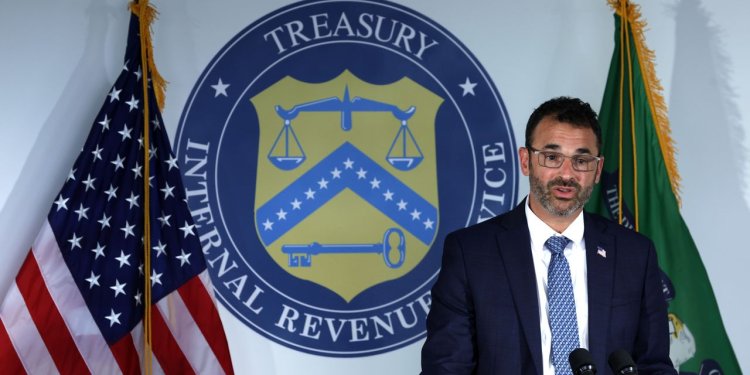J.D. Vance: Meet the New IRS, Same as the Old IRS
Even with $80 billion in new funding and 87,000 new agents, the agency is as dysfunctional as ever. By J.D. Vance Aug. 17, 2023 6:40 pm ET IRS Commissioner Daniel Werfel speaks at an event in McLean, Va., Aug. 2. Photo: Alex Wong/Getty Images The Internal Revenue Service recently tried to reinvent itself. Earlier this year, outfitted with an additional $80 billion and 87,000 new agents, the agency unveiled a new set of priorities for the next eight years. Its Strategic Operating Plan promises to “deliver transformational change for taxpayers” while improving services and quickly resolving enforcement issues. That may sound too good to be true—because it is. For thousands of small businesses, the IRS hasn’t only failed to change its ways, it’s gotten worse. Millions in promised tax relief from the Employee Retention Credit, or ER


IRS Commissioner Daniel Werfel speaks at an event in McLean, Va., Aug. 2.
Photo: Alex Wong/Getty Images
The Internal Revenue Service recently tried to reinvent itself. Earlier this year, outfitted with an additional $80 billion and 87,000 new agents, the agency unveiled a new set of priorities for the next eight years. Its Strategic Operating Plan promises to “deliver transformational change for taxpayers” while improving services and quickly resolving enforcement issues. That may sound too good to be true—because it is.
For thousands of small businesses, the IRS hasn’t only failed to change its ways, it’s gotten worse. Millions in promised tax relief from the Employee Retention Credit, or ERC, has yet to be processed—while the threat of enforcement and the challenge of compliance grow. The ERC was drawn up by Congress during the height of the Covid pandemic as businesses closed and sent their workers home. In an effort to protect payrolls and avert mass layoffs, the Cares Act included the refundable tax credit, which compensated businesses for pandemic-related losses and wages paid to employees. Eligible businesses could claim up to $5,000 an employee.
The ERC was a pragmatic policy with a sensible goal. Congress was right to relieve the tax burden on small businesses as they bore the brunt of government-mandated lockdowns. But even Washington’s best efforts ran into a roadblock: the IRS. The agency is buried under more than half a million unprocessed ERC tax forms submitted by businesses across the country.
You would think that an agency with an influx of new resources could process these forms and provide businesses with long-overdue tax relief. You would be wrong. Progress has been slow. Rather than processing claims and getting money out the door, the IRS discouraged taxpayers from claiming the credit. Proactive outreach has been limited to press releases and notices that few small business owners would see. If that weren’t enough of an insult, Commissioner Daniel Werfel falsely claimed last month that the agency had cleared its ERC backlog.
It’s a microcosm of what’s wrong with the IRS and Washington. In too many cases, the federal government suffers not from a lack of capacity, but from a lack of focus. Even with all the necessary resources, an agency with multiple priorities and competing incentives will struggle to accomplish anything good.
There is another lesson here about how we craft federal policy. Consider a complementary business-relief program in the Cares Act, the Paycheck Protection Program. Unlike the ERC, the PPP was a novel program without precedent in American history. It extended forgivable loans to businesses to help them make payroll during the harshest days of the Covid-era recession.
The program was popular and effective not only in the eyes of business owners and lawmakers, but in the eyes of my fellow conservatives. Doug Holtz-Eakin, president of the American Action Forum, a free-market think tank, and former director of the Congressional Budget Office, called the PPP “the single most effective fiscal policy ever undertaken by the United States government.”
The secret to the program’s success? It relied on local bankers, not Washington bureaucrats. The Small Business Administration provided the money, but it was private financial institutions—namely America’s regional and community banks—that determined eligibility and funneled the loans into the accounts of cash-strapped businesses and ultimately the pockets of struggling workers.
Like any policy, the PPP wasn’t perfect. Some businesses applied money they didn’t really need or used it for illicit purposes. The urgency to get money to desperate firms meant that it sometimes ended up in the wrong hands. This wasn’t unique among Covid-era support programs—including the ERC. Such fraud should be mitigated in the future, and repayment of fraudulent loans should continue to be enforced. It shouldn’t, however, keep deserving recipients from their promised payments.
Republican policy makers have long been fond of saying that government should be run more like a business. However glib the remark, the lessons of Covid relief demonstrate that to meet novel challenges and devise effective programs, public policy should leverage the benefits of the market-based system not seek to tame them.
But for the time being, government must make good on its promises. It should start by cleaning up the mess it made of the ERC and provide long-overdue relief to American businesses. That would be a true “transformational change” from the agency’s current disorder and dysfunction.
Mr. Vance, a Republican, is a U.S. senator from Ohio.
What's Your Reaction?

















